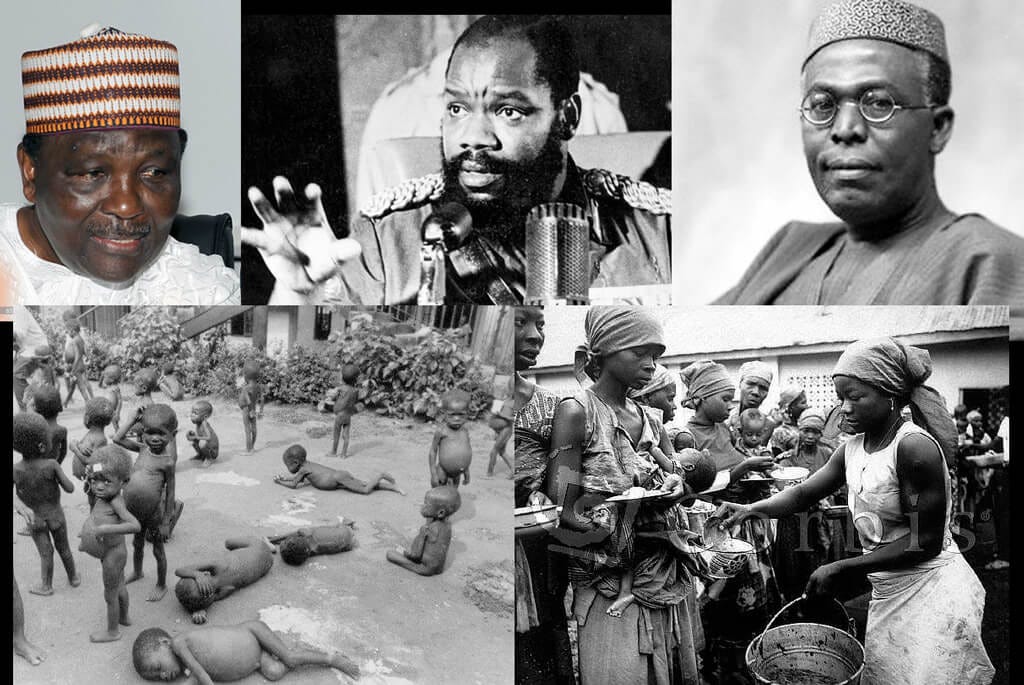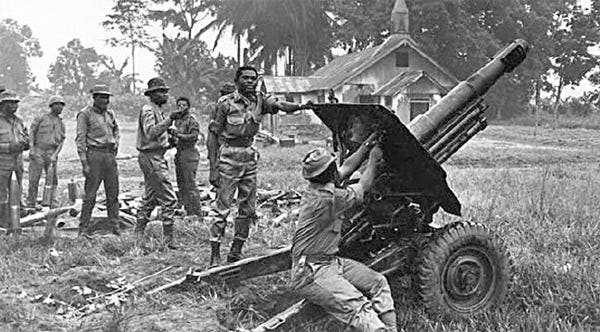THE CIVIL WAR AND NIGERIA'S HISTORY OF TOMORROW
History suggests nothing was learnt from the Civil War

Nigeria’s political trajectory was changed forever when on January 15, 1966, a group of soldiers mostly from the Igbo stock struck and killed 22 senior officers, mostly from the Northern part of the country. Leading politicians killed included the Prime Minister, Alhaji Abubakar Tafawa Balewa, the Premier of the Northern region, Sir Ahmadu Bello and his counterpart in the West, Chief Samuel Ladoke Akintola, among other leading lights of the first republic.
On January 15, 1970, a bitter civil war ended with the Biafrans, largely of Igbo ethnicity, surrending to their former Nigerian military colleagues. Again July 6, 1967, the Nigerian government declared a war against the Biafrans led by Lt Colonel Odumegwu Ojukwu. Col Ojukwu had been appointed the governor of Eastern Region by Major General Aguiyi Ironsi who emerged Head of State after the failed January 15 putsch.
It is important to note that on September 25, 1967, about 61 days after the first bullet was fired to crush the Republic of Biafra, Mazi Nnamdi Kanu was born. Now, Mazi Nnamdi Kanu aged 54 years, is today leading the Indigenous People of Biafra (IPOB) in a fratricidal and violent agitation for the secession of the same Biafra which the world thought had ended in 1970 when Kanu was barely three years old. By coincidence, January 15 is Armed Forces Remembrance day when the armed forces remember all its fallen heroes from different combats starting from the Nigerian civil war and many other combats it got involved in around the world. It also honours veterans of the first World War and the second World War.
Are all these dates mere coincidences, especially January 15? No, they are not. January 15 defines the history of modern Nigeria. Nigeria has no modern history without January 15. January 15 is the history of Nigeria's tomorrow. January 15, 1966 told the history of domestic attempt to redesign Nigeria from the selfish construction that was given to it by the colonial administration. It tells the history of what Britain sought to cover up that can't but be exposed. It told the history of the fact that no Nigerian will ever agree to be slave in their country.
Disaffected by the lopsided geo- political arrangement that made one part of Nigeria bigger than the other two components put together, an arrangement that guaranteed perpetual domination by the octopus component, a crop of young and ebullient officers who happened to be from the Igbo stock struck in an attempt to change the order. The failure of January 15 taught the lesson that infantile zeal is not enough to build a nation. Zeal must be moderated with knowledge and wisdom and age.
Rather than seize power, the young officers lost power to the then Supreme Commander of the Armed Forces, Major General Johnson Aguiyi Ironsi who was least prepared for the sudden task. The young lieutenant that was assigned to kill him found his hand unable to pull the trigger at the sight of General Aguiyi Ironsi. It happened that this young officer and Aguiyi Ironsi were from the same Igbo ethnic stock which led to the feeling in the North that the coup was targeted against it, a feeling that led to the reprisal coup of northern officers.
The 1966 counter-coup, or the so-called "July Rematch", was the second of many military coups in Nigeria. It was masterminded by Major Murtala Muhammed and many northern military officers. The coup began as a mutiny at roughly midnight on July 28, 1966 and was a reaction to the killings of Northern politicians and Officers by some soldiers on January 15, 1966. The July counter coup resulted in the murder of Nigeria's first military Head of State General Johnson Aguiyi-Ironsi and Lt Colonel Adekunle Fajuyi, the military governor of the Western Region (who was hosting a visiting Aguiyi-Ironsi) in Ibadan by disgruntled northern non-commissioned officers (NCOs). Upon the termination of Ironsi's government, Lt. Colonel Yakubu Gowon was appointed Head of State by the July 1966 coup conspirators.
However, this time around the young officer, Major Theophilus Yakubu Danjuma assigned to arrest and eliminate the head of state, General Aguiyi Ironsi did not miss his target. Today, Theophilus Danjuma who climbed up rapidly on the ladder of military hierarchy to retire as Lt. General and Chief of Army Staff, as well as member of the nation's Supreme Military Council is a beneficiary of a juicy oil well located in the South south region of the country, an allocation which has catapaulted Danjuma to the ranks of billionaires in the country. In short, the likes of Theophilus Danjuma are the main beneficiaries of military incursion in politics.
So January 15, 1966, as well as July 28, 1966 tell the history of military adventurism in Nigerian politics and the failure of such adventurism and how it can catapault its partakers to a wealth that does not match their intellectual capacity or business acumen. It is the gateway to unearned wealth and sudden lust for material things that has launched the nation to such a frightful path of corruption, which is hardly seen in any other country in the world, and which is threatening to snuff out the life off the country.
Moreover, January 15 reveals the story of Nigeria's misfortune in the sense that it did not have nation builders at its inception. Rather they were individuals whose only interest was solely self-aggrandizement. To describe their interests even as that of the regions they represented is to dignify them with what they don't deserve.
They lacked vision and their interest was rather religious, a rather dissappointing thing that can never build a nation. Religion was used to explain away lack of capacity and disciplined thought necessary to build a nation that had the propensity to shoot ahead of even some of the advanced nations in the world.
By the same token, January 15, 1966 and July 28, 1966 and the civil war it produced due to the failure of leadership, and also IPOB which came about fifty years after Kanu was born, and about 50 years after the war ended officially, sum up the story of Nigeria tomorrow.
What is that history? It simply means that the generation of officers like President Buhari who fought in that bitter war must be allowed to rest from the nation's politics. Nobody who took part in Nigeria's bitter past must be allowed again in her politics if tomorrow's history will be different. They have not allowed the bitter consequences of those events to teach them useful lessons, hence they can't be taught again.
The truth of that is revealed in the rancour and bitterness that overflows in Chief Bisi Akande's autobiography, My Participations, which was recently published and launched in Lagos. The fallout from the publication continues to revebrate across the country. That bitter and unforgiving generation who continue in the religious schemes of the 60s must be allowed to rest. Nigeria now needs fresh minds to move into its tomorrow.
Basically, Nigeria's civil war is the history of what a people in dire need can produce for themselves. Biafra was able to produce its own arms and ammunition, no matter how crude. Also, armoured cars were manufactured, while its scientists also succeeded in refining crude oil. Also, through its ingenuity airstrips were built where planes landed with vital and critical supplies. Many scientists and engineers gave a good account of themselves during the civil war.
For example, Felix Nwankwo Oragwu, the physicist was drafted from University of Nigeria, Nsukka to head Biafra's Research and Production (RAP) group. Oragwu who helped the Biafran Army with the manufacture of equipment in the face of serious lack and handicap was angry that Biafra scrambled for power at the centre after the war.
He's of the view that Biafra would have concentrated on the technological gain of the civil war to build a technology hub that will be the envy of the world. He said the war was the opportunity to reject the colonial design in which Nigeria was meant to be excluded from the production and manufacture of solid technology. Felix Nwankwo Oragwu was allowing the civil war to tell the history of Nigeria's tomorrow. Would fresh minds arise and take the nation to that history?
Guest Writer:
Tunde Akande is both a journalist and Pastor. He earned a Masters degree in Mass Communication from the University of Lagos.








